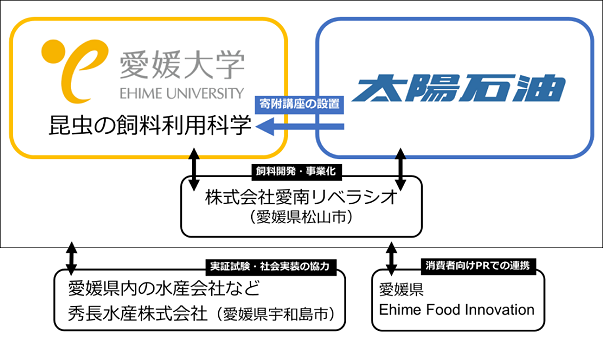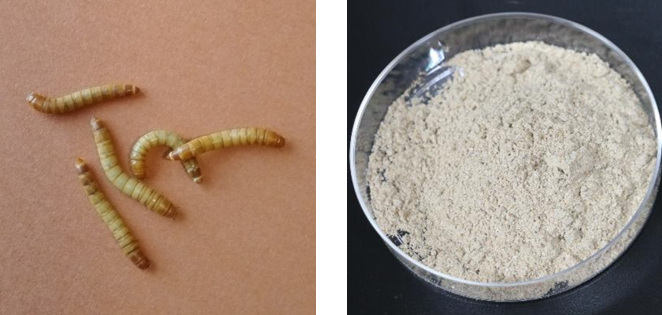2022.05.27
Taiyo Oil (President & CEO: Yutaka Oka) has established an endowed lecture course at Ehime University entitled “The Science of Insect Feed Utilization.”
Event outline
Insects have been garnering attention as a resource for food and feed that can be produced sustainably. With the global population increasing explosively, countries worldwide have been moving forward with entomophagy as a means for saving people from a future food crisis, and the development of feed for livestock and fisheries that makes use of insects.
Taiyo Oil has been focusing on the results of research concerning insect-feed utilization that has been carried out at the Ehime University Graduate School of Agriculture since 2009, and through the establishment of the abovementioned endowed lecture course, will carry out research and development with the aim of commercializing the production of insects for feed.
The research led by the endowed lecture course will receive participation from Ainan Liberacio Co., Ltd. (a venture company started at Ehime University) and assistance from fishery companies, etc. of Ehime Prefecture, and at the same time, collaboration with Ehime Prefecture’s “Ehime Food Innovation Consortium” will be sought. Based on this, the researchers will carry out the development and social implementation of feed for cultivation that will help to increase the sustainability of aquaculture, which is a local industry of Ehime Prefecture.
Currently, preparations are being carried out for a demonstration experiment at a cultivation area with assistance from Hidecho Suisan Co., Ltd. (Uwajima City).
Name
The Science of Insect Feed Utilization
Content of activities
Developing technologies for producing insects suitable for food and feed
Developing feed for cultivation making use of abovementioned insects,
and carrying out demonstration experiment
Engaging in “science communication” with consumers involved in using insects for food
Time period
two years from June 1, 2022 to May 31, 2024
System for implementation of endowed lecture course
Background and objective of establishing endowed lecture course
Ehime University has been focusing on “insects” as a new animal resource for the era of the population explosion. The practical use of insects for the production of food has been becoming popular worldwide, and this has included entomophagy being recommended by the United Nations Food and Agriculture Organization (FAO).
Amid this situation, in the area of aquaculture, a “food crisis” has been emerging. Aquaculture relies on fish meal produced from natural sardines, etc. for the animal protein that is required for feed. Nevertheless, due to the global expansion aquaculture production volumes and changes to marine environments, fish meal production volumes have been slumping and prices have been continuously rising. Furthermore, approximately half of the fish meal used in Japan is imported, so many issues have being arising regarding food self-sufficiency.
Taiyo Oil and Ehime University believe that the greatest issue regarding aquaculture today is the fact that the system of “raising fish with fish” has not yet been eliminated. Like the way that livestock conflicts with food, food crops have structural problems since “crops that people can eat are being used to raise animals for people to eat.” In order to resolve such problems, it will be necessary to build new mechanisms that are modeled after the matter cycles of ecosystems.
There are species of insects that can efficiently be produced from unused resources such as food residues. These can serve as excellent animal proteins that can be produced within Japan, and thus they are promising as raw materials for feed that will be able to replace fish meal. The results of experiments thus far have shown that feed derived from insects developed by Ehime University have provided outstanding growth to farmed fish in comparison with fish-meal feed, even when absolutely no fish meal is used. Nevertheless, technical issues remain regarding how to produce insects for feed cheaply and in large volumes, and thus ongoing research and development is needed in order to achieve the practical use of such feed.
Centering on Ehime University and collaborating companies, the abovementioned endowed lecture course will aim create the world’s first model for the food production of the future.
Insects for feed (left) and powder made from such (right)

